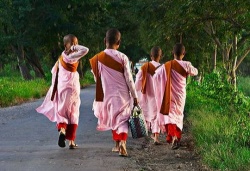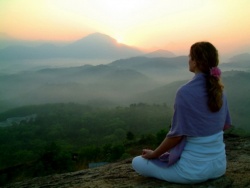Dasa kusala kamma (ten wholesome actions)
"Dasa" means 'ten'. "Kamma" is a Pali word which means 'action'. In Sanskrit it is referred to as 'Karma'. Kamma includes both past and present actions. "Kusala" means wholesome, moral or good. In other words "Dasa Kusala Kamma" means Ten Wholesome Actions. There is good or bad Kamma. Kamma covers all kinds of intentional action whether mental, verbal or physical (thoughts, words and deeds). Both good and bad Kamma produces rebirth but good will bring about conditions which are favourable while the bad unfavorable. In simple language, do good and good will come to you, now and hereafter. Do bad (Akusala) and bad will come to you. A person who has eradicated all good and bad actions has reached Nibbana and will not be reborn and is called an Arahant. The results of good or bad Kamma can be experienced in this life, the next or a subsequent one.
Where is Kamma stored ?
The Kammic energy is not stored anywhere within or without the body, just as wind is not stored in any particular place. It is like the energy stored within a mango seed. Given the right conditions, the mango seed will sprout from the seed, producing leaves, flowers, mangoes and gives rise to other mango trees.
Kamma is action and Vipaka is the fruit or reaction. Just as every object has a shadow, every activity is accompanied by results.
Akusala Kamma is the opposite of Kusala Kamma. Akusala Kamma are unwholesome, immoral or bad actions.
DASA PUNNAKIRIYA
'Punna' means 'merits'. Dasa Punnakiriya means Ten Meritorious Actions. Merits can be defined as actions of thoughts, words and deed which purify and cleanse the mind.
Merits are performed with devotion and kindness usually for the purpose of obtaining materialistic returns / rewards. The rewards from performing merits ends after the good result is experienced. That is why lay Buddhists are encouraged to perform a lot of merits in order to benefit not only oneself but other beings as well. One who performs merits has no obstacles and succeeds in whatever he does.
Kusala Kamma on the other hand, is performed with no ulterior motives or reward wanted. By practising these good deeds it reduces craving, jealousy and ignorance. It transforms into a healthy mental attitude which straightens one's mind in doing good. It remains in one's mind as mental habits until the next life continues.
As seen, both of the above. i.e. Kusala Kamma and Punnakiriya are both good actions but the difference is the 'purpose' or motive behind the actions.
TEN MERITORIOUS ACTIONS - DASA PUNNAKIRIYA
In Pali In English Effects :
1. Dana - Generosity Wealth
2. Sila - Morality Birth in noble family and in states of happiness
3. Bhavana - Mental Culture Births in Form & Formless Realm
4. Apacayana - Reverence Noble parentage
5. Veyyavacca - Service A large retinue (attendants)
6. Pattidana - Tranference of merits To give in abundance in future birth
7. Pattanumodana - Rejoicing in others' merits Productive of merit wherever one is born
8. Dhammasavana - Hearing to the Dhamma Wisdom
9. Dhammadesana - Expounding the Dhamma Wisdom
10. Ditthijjukamma - Straightening one's views Strengthens one's confidence
TIPS : (Give Me More Reminders So That Repeated Hearing Ensures Success).
1. DANA / Generosity
Generosity is the basic practice of Dhamma. Generosity is the sharing for the benefit of others. One can give food to the hungry, medicine to the sick and money to the poor. To the monks requisites like robes, almsfood, shelter and medicine.
2. MORALITY
Bu observing the precepts and leading a harmless life, a person grows in compassion and wisdom. A Buddhist does not observe the precepts out of fear of punishment. A person who obseves his precepts enjoys many more blessings and advantages over a crooked man, here and now.
3. MENTAL CULTURE
Mental culture or meditation aims at developing insight and the growth of wisdom. One meditates to calm the mental defilements and to cultivate the spiritual experience so that one can understand the real nature of things. This wisdom leads to Nibbana.
4. REVERENCE
One who practises respect and reverence develops and purifies his mind by replacing pride with humility/humbe. One who is humble is flexible and is never too proud to learn. In Buddhist Society, children respect adults; citizens respect the king; lay people respect the Buddha, Dhamma and the Sangha.
5. SERVICE
Helping others is another way of performing merits. Thinking of good and compassionate thoughts is not enough. One must express compassion and actually perform the service for the welfare of other
6. TRANSFERENCE OF MERITS
A person who shares the merits of his good deeds with others so that the performance of these deeds are not only for his self interest and his well being.
7. REJOICING IN OTHERS MERITS / GOOD DEEDS
Cultivating appreciation and gladness at others' happiness is a positive quality and eradicate jealousy. One must learn how to praise and congratulate instead of making excuses to gossip and criticize. Buddhists usually say "Sadhu" meaning Excellent when someone has done a good/noble deed.
8 & 9 HEARING & TEACHING (EXPOUNDING) THE DHAMMA
Teaching and listening the Dhamma goes together because there must be a giver and there must be a receiver. Teaching the Dhamma leads to the relief of one's suffering and also help one to understand the true nature of life.
Listening to the Dhamma means concentrating one's attention on the Dhamma and reflecting on how the teachings can be applied to one's life.
10. STRAIGHTENING ONE'S VIEWS
A person suffers more from his own foolishness than because of others. Thus, through one's own efforts one gains peace and happiness by having Right Views. This will result in bringing him closer to understand the Dhamma.




